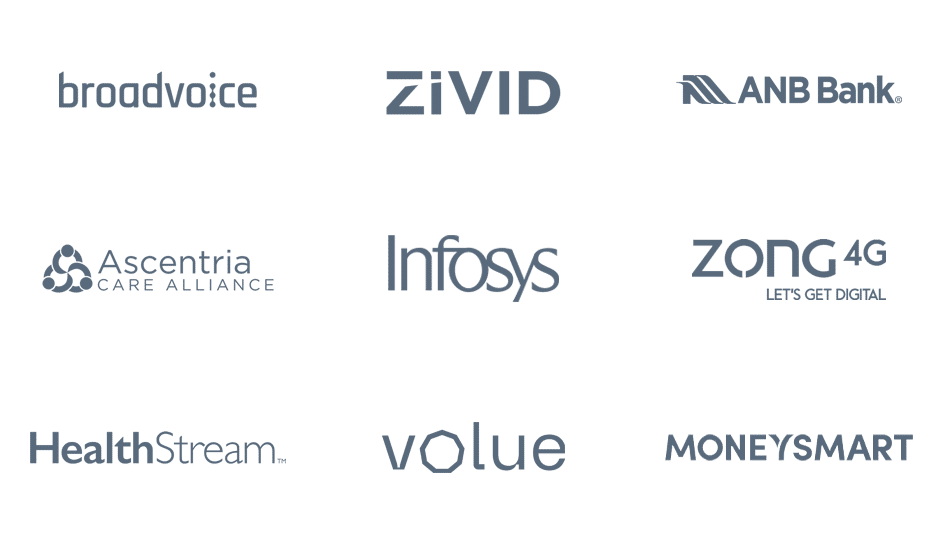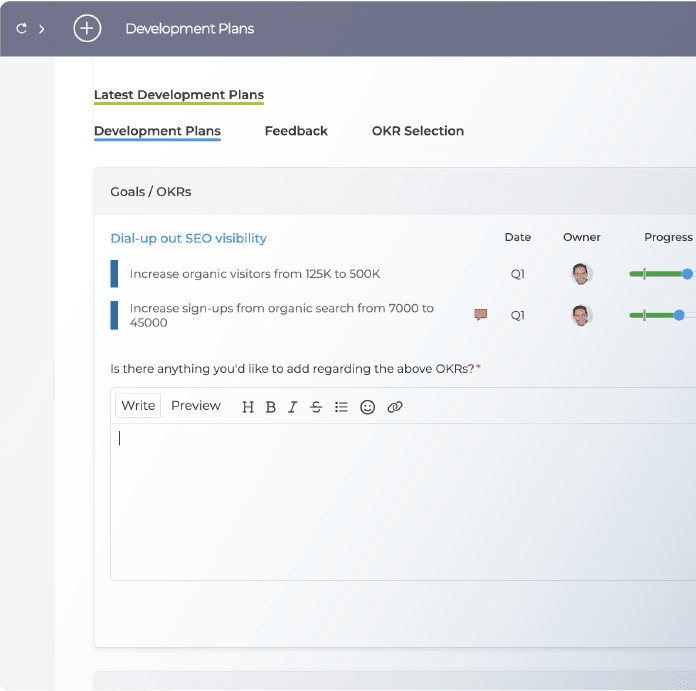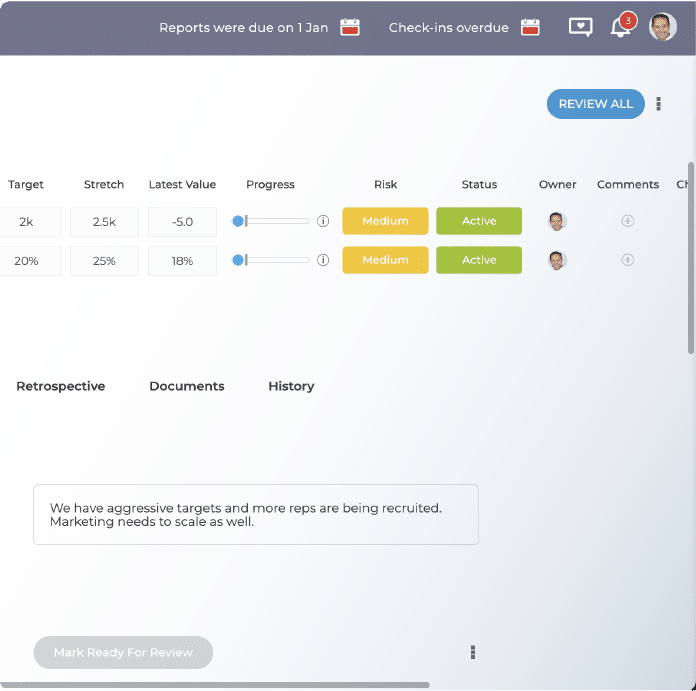Create a Performance Appraisal System that boosts performance with ZOKRI
An employee performance system along with employee appraisals are a necessary part of ensuring that your teams are performing at their best.
Trusted by fast growth companies

“By creating an employees performance system and setting aside time to review each employee’s performance, you will systematically improve performance across the whole organization.
A functioning performance appraisal system gives employees the opportunity to reflect on their own performance and set goals for the coming period e.g. quarter.”
-
No Surprises
Performance appraisals help ensure that teams are meeting the organization's expectations. When managers sit down with each employee and review their performance, they can get a better sense of whether they're meeting expectations and what areas need improvement.
-
Better Communication
Performance appraisals foster communication between managers and employees. Performance appraisals offer a chance for managers and employees to communicate openly about job performance. This communication can help identify any misunderstandings or miscommunication that may have occurred.
-
Scheduled Reflection
Performance appraisals give employees the chance to reflect on their own performance. Appraisals provide employees with an opportunity to step back and assess their own work. This reflection can be helpful in identifying areas where they excelled and areas where they need to improve.
-
Pinpoint Needs
Performance appraisals can identify training and development needs. If an employee is struggling in a certain area, an appraisal can help identify training and development needs. This can be beneficial for both the employee and the company, as it can lead to better job performance and more engaged employees.
3 important things to bear in mind when planning Performance Appraisals
When it comes to employee annual appraisals, there are a few things you need to keep in mind.
-
Frequency
Performance should be appraised frequently with tools like logging completed priorities and wins in ZOKRI, along with anytime feedback and 1-on-1 records being a good way of keeping track of what really happens each week, and not letting biases creep in.
-
Objectivity
Ensure that the appraisals are fair and objective. Something that ZOKRI has invested a huge amount of thought into and solved.
-
Permanence
Appraisal processes need to be well documented so that there is a record of what happened. Another benefit of centralizing goals, Performance Appraisals in ZOKRI.

The purpose of a Performance Appraisal System
A Performance Appraisal System like ZOKRI needs to be collaborative and ongoing. The stakeholders that need to be satisfied with the system and processes within the system are:
- Employees
- Line Managers
- Leadership
To be successful the Performance Appraisal System needs to satisfy the following requirements:
-
Team and individual focused
Focus on team as well as individual results - having team and individual goals in one system like ZOKRI is really useful - these goals can be directly referenced in appraisals.
-
Create 360 engagement
Ensure employees and line-managers fully engage with the process. ZOKRI helps track the process and provides useful reminders.
-
Contain minimal bias
Eliminate biases from the system you create - anytime and 360 feedback is one the ways ZOKRI helps reduce biases from the process.
-
Be consistent and measurable
Ensure the process is consistent and measurable - templates, OKRs, KPIs and grading can help with this in ZOKRI.
-
Be human
Combine measurable goals / OKR with more human aspects like skills, competency and behavioral elements - these hard measurable ways and softer ways of appraising performance can both be done as part of your appraisal process in ZOKRI.
-
Ultimately actionable
Trigger training and development conversations and plans.
“Don’t just say that your people are your most important asset, prove it. Your actions will define the company you are and want to be, not your corporate rhetoric.”
Solving the challenge of measuring team vs. individual effort and results
Leaders talk about creating high performing teams not individuals. Yet most performance appraisals are about the individual, yet you want teamwork to be the engine room of your growth.
How do you solve this dichotomy?
You create a clear, transparent, measurable, fair and systemized way of appraising performance.
The key elements of a Performance Appraisal System
To create a performance appraisal system that values the performance of the company and team, as much as the individual, is to ensure the right elements of the system are in place and interconnected. These are elements a good performance appraisal system needs to have in it.
Company KPIs and OKRs
The leadership team should share the KPIs and OKRs that are going to keep score on how the organization is performing from quarter to quarter. In ZOKRI this is easy to do with each employee finding the transparency of this visibility refreshing.
Department KPIs and OKRs
Department heads, team managers and their reports need to agree on their KPIs and have fully bought into them as measures of performance.
The OKRs setting process will then allow teams to agree the Objectives and measurable outcomes aka Key Results that move the needle of performance. The KPI scoreboards should always feel the impact of OKR progress.
These KPI scorecards and OKRs can then be tracked and made visible in ZOKRI and referenced as part of the performance appraisal system.
Individual KPIs and OKRs
It’s common for some employees to have their own KPIs or performance based OKRs e.g. Sales Representatives. It’s also common to have developmental OKRs where getting experience and acquiring new skills or competencies may have the goal. These too can be created in ZOKRI with these “personal OKRs” being more discreet and only visible by line-managers and HR.
Agree the right values and behaviors - human attributes
Not everyone will impact company, departmental and team KPIs equally. It is certainly not impossible that some employees could soft-pedal and the team could thrive.
So you can’t over-index on these KPIs and OKRs when creating a performance appraisal system. At the same time they need to be part of it as every employee has contributed to them in some way.
You therefore also need a softer, more human way of assessing contribution and performance as well.
With the help of your team you need to be able to answer this question
- What are the values, behaviors, and personal attributes that members of your organization and specific teams would have to display in order to improve the agreed KPIs and achieve progress on the OKRs?
The aim should be to start with a long list and end up with a shorter list that ideally has a ranking order, as some of these will be much more important than others. Each team will come up with a different list, but you should also expect similarities.
In ZOKRI it’s easy to share these along with company values and competencies / skills that you’d like to recognize and be recognized for as part of the performance appraisal process.
Recognition can happen by using the ZOKRI 360 review features or anytime feedback features.
Weighting and grading
You’ve now got three inputs. What a lot of companies now do is weight the importance of these to help with a grading or scoring of performance. A performance grade or score can then be attributed to each of the areas.
- Team performance
- Personal performance
- Human attributes
- Team performance (40%)
- Personal performance (20%)
- Human attributes (40%)
Future goals, learning and development
Allowing employees and managers to agree to future performance and developmental goals is a key part of the process you want to create. Of course this is easy to do in ZOKRI.
Conducting performance appraisals
In order to eliminate the biases that creep in with line-manager only performance reviews it is better to use for inputs:
- The person being reviewed (self)
- Colleagues / co-workers (team)
- Line-managers

These inputs can then be managed in ZOKRI.
Performance appraisals templates
There are many different possible sections and questions that form part of your performance appraisal templates. In fact, ZOKRI allows a huge variety of options to the point that nearly every possible type of input our customers are trying to manage as part of the process can be accommodated. Here are some examples of questions that support the process outlined.
What’s your assessment of how team KPIs / OKRs progressed this quarter?
Here you can use ZOKRI’s ability to let employees see OKRs in appraisal templates, add blocks of text with lists etc, as well as using grades. E.g.. The choices are always yours.
- Exceeded all targets
- Exceeded most targets
- Exceeds some targets
- Missed targets

What are the issues being faced in the team and where are the opportunities to improve? Which areas do you feel the team needs to make progress on in order to improve our KPIs next quarter?
This question is the genesis of most great OKRs and systematically collecting this information is a great starting point for further team conversations when setting OKRs for the next quarter.

What’s your assessment of how your personal KPIs / OKRs progressed this quarter?
Again you can use ZOKRI’s ability to let employees use grades here. E.g.:
- Exceeded all targets
- Exceeded most targets
- Exceeds some targets
- Missed targets
Which areas do you feel you need to make progress on in order to support the team during the next quarter?
Again this question will act as the genesis of your performance and developmental OKRs.
Feedback from Colleagues
ZOKRI allows you to show recognition received from week to week as well as when requested as part of a 360 review process via a 360 review template.
This then sets up a number of options for you. For example:
Based on this feedback which areas would you like to improve on over the next quarter?
You could use either text entry or the selection of attributes again in the same way.
Is there anything the company could do to better support your development and growth?
A company might support employee development and growth for a variety of reasons.
When employees have the skills and knowledge they need to do their jobs effectively, they are more productive and able to contribute more to the organization. Investing in employee development can lead to increased productivity.
A supportive company culture can also help to keep top talent. Employees who feel that their employer cares about their growth and development are more likely to be satisfied with their jobs and less likely to seek out other positions.
Employee development can also lead to increased innovation and creativity. Employees who are exposed to new ideas and ways of thinking may be more likely to find creative solutions to problems and challenges.
And of course, supporting employee development can help to create a positive organizational culture and can foster a sense of teamwork and collaboration. Employees may feel more loyal and committed to an organization when they believe their employer values their growth and development.
Is there anything else you would like to discuss as part of this appraisal?
At the end of an appraisal it’s important for a manager to ask open-ended questions that allow the employee to provide detailed and thoughtful responses. This will help the manager get a better understanding of the employee’s perspective and help identify areas for improvement or growth.
Overall score
You might then choose to use weightings and grades that have been collected to provide an overall final grade. Ultimately, it’s whatever works best for you and your culture.
HOW IT WORKS
Reach your full business
potential with ZOKRI
ZOKRI makes it easy for you to adopt the best practices of high performing companies and teams. Cascade, Mission, Visions, Strategy and OKRs. Embed critical processes like check-ins and high impact team meeting to keep everyone on-track. Dial-up energy and engagement from bottom-up with a systemized approach to personal development, recognition and reward.
Step 2
Invite your team to try ZOKRI for weeks, not days, to make sure it’s a great fit
Step 3
See and feel the difference having ZOKRI has made to your teams performance
- Latest Resources
- Events
- United Kingdom
Ashtead
KT21 1RZ
+44 20 7046 1328

- United States
New York
NY 10013
+1 646-718-4720
- ZOKRI helps leaders and teams achieve strategic goals using the OKR (Objectives & Key Results) framework. Our platform aligns strategy, goals, and people, fostering engagement and growth through comprehensive training and management systems.
© ZOKRI 2026 All rights reserved | Privacy Policy | Terms & Conditions | GDPR